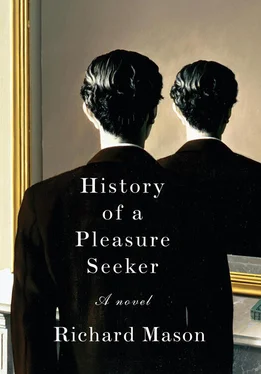His partner, an American named Lionel Dermont, whom he had met in the first-class dining room of the French liner Provence , appeared to have much less money now than he had seemed to have then. Indeed, Maarten was no longer sure Dermont had ever had the sums he claimed. Over his six weeks in the United States he had developed an energetic dislike for the man, who dressed so elegantly and told everybody what to do and contributed little of tangible worth to anything.
Lionel Dermont was a talker. Maarten Vermeulen-Sickerts, except with his closest associates, was not. Mr. Dermont’s talk was generally the greatest rot and this did not make his monologues easier to endure. He had a thousand sincere ways of explaining the delay of a check, and though he had long ceased to contribute to the construction costs he was fiercely loyal to his vision of a hotel “fit for potentates” and determined to spend as much of Maarten’s money as was necessary to achieve it. In this he was gleefully abetted by the architect and the gentleman responsible for the interiors. Through his acquaintance with these three men Maarten derived the inaccurate but unshakable impression that all Americans are brash and acquisitive and painfully dull dining companions besides.
Mr. Dermont’s stylish postponement of his latest installment of capital had inspired Maarten to investigate how best to cope with future emergencies alone. He lunched with his bankers at the Knickerbocker Trust Company and sounded them out on the possibility of a further loan. But the shiny confidence expected of men who attempt to borrow large sums of money in New York was impossible for Maarten to emulate, since it would have been so unacceptable in Amsterdam. As he left their monumental offices on Fifth Avenue, he was aware that he had not done well.
This knowledge preoccupied him throughout his return voyage, during which he began to believe that God disapproved of his spending such sums and energies on a monument to human vanity. By the time his own door was opened to him he was feeling morose and apprehensive. Though he had not hesitated to spend $180 on an evening cloak for Louisa and only slightly less on gowns for Constance and Jacobina, he knew that he should not have bought them. It was a further challenge to the deity.
Jacobina was unusually solicitous when she came to chat in his dressing room before dinner. As he embraced her, he felt a tug of violent desire that horrified him and made him step backwards to avoid giving his Creator further offense. He could see that this annoyed his wife and did his best to be bright and amusing at dinner; but in fact the only thing that lifted his spirits was the way in which Constance and Louisa appeared to have dropped their guard with Piet Barol. Maarten was glad of that. He had often been cruelly cut by ladies like his daughters when he was a young man. He was pleased for Piet that it was 1907, not 1877, and that the world had moved on.
When dinner was over, Egbert was allowed to come down, having dined on sugared bread and milk in his room; and watched impassively by Didier Loubat the whole family unwrapped their gifts and exclaimed over them as the salon filled with tissue paper and ribbons.
Observing this happy scene, Piet saw that his father’s presence disturbed Egbert and that he took care not to come into contact with any of the brightly colored paper; also that he shifted surreptitiously from foot to foot over the wreathed roses in the carpet, following a secret dance of his own.
Maarten had brought the boy a bright red fire engine and knew at once that Egbert did not care for it. He had no idea that the Shadowers were deeply suspicious of primary colors and that merely holding such an object required tremendous courage. This meant he was unmoved when Egbert carried it the whole way across the room to give to Hilde Wilken to take upstairs. Maarten saw only a sullen, pampered child, too fussed over by women, and this depressed him and reignited his anger over Mr. Dermont.
Jacobina knew her husband well and understood that Egbert was likely to be shouted at if his father’s mood did not improve. Maarten’s mounting impatience irked her and added insult to the injury he had done her in his dressing room. “Do sing us a duet, darling, with Mr. Barol,” she said. Maarten had a decent voice and was always happier after using it. “Why not something by Bizet?” she added slyly, to punish him for his failures as a lover and a father.
Maarten, who had no appetite for conversation, was touched by his wife’s suggestion. “Capital idea. What say you, Mr. Barol? Do you think we might manage it? We have Carmen somewhere.”
But Piet had a better idea. He took out the Pêcheurs de Perles and suggested that they sing the duet commonly called “Au fond du temple saint.” “Two old friends are reunited but fall in love with the same divine beauty. It nearly makes them enemies but in the end they swear eternal friendship.”
“A splendid theme.” Maarten took his glasses from their case and peered over the music. He remembered it was devilish tricky to fit the words to the notes.
Both men were baritones and the duet called for a tenor, so Piet took the higher part and sang it in falsetto. He had played the piano arrangement so often he had no need to look at his hands, and this left his eyes free to direct the meaning of the music as he wished. As he sang of the crowd falling to its knees, astonished at such loveliness, he stared fixedly over the piano lid and into the room beyond. Constance and Louisa were on the daybed, as usual. Egbert sat on a little stool at his mother’s feet. Jacobina’s chair was against the farthest wall, and her children could not see her face without turning round. This meant that when Piet sang “Look! There is the goddess!” no one saw that he did so straight into Jacobina’s eyes; nor did anyone observe that she met his gaze unflinchingly.
Now Maarten joined him in rapt appreciation of the heavenly figure’s beauty. But when he sang “O vision! O dream!” he was looking at Piet’s hands to make sure his timing was accurate, and it struck Jacobina as significant that he should sing these words without even thinking of her. This made her bolder and she put down her embroidery. Now the male voices joined forces in rapturous major thirds, and though Maarten’s pitch wobbled occasionally they made a fine sound. Singing straight to Jacobina, Piet declared that love had taken their hearts by storm and was turning them into enemies.
At this, Jacobina smiled.
But now the music was gaining control of them and Maarten was confident enough to look up from time to time, which meant that he was looking directly into Piet’s eyes when he sang, “No, nothing will separate us!”
Piet Barol was genuinely moved. He had chosen the duet in order to communicate with Maarten’s wife, but the passion of the music, the platonic fidelity of the male lines, drew him increasingly towards the man he had cuckolded. As they swore lustily to be friends forever, to treat each other as brothers, and promised that the goddess would unite them one day, Piet began to feel a mounting filial devotion. He did love Maarten, and the soaring declarations they made to each other dimmed his consciousness of all else. They sang the last chorus triumphantly, in a perfect unison of pitch and pace that left them feeling tender and inseparable, enormously refreshed, as though Bizet’s rich harmonies had released the toxins from their souls.
Ten hours after closing his eyes, Maarten woke with the conviction that Piet Barol could be a useful ally. He had built his fortune on recognizing exceptional talent and did not consider that a man of Piet’s gifts was best deployed teaching German verbs to a troubled little boy.
Читать дальше












